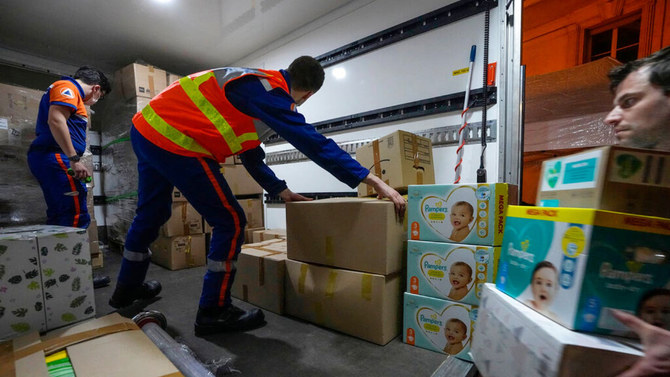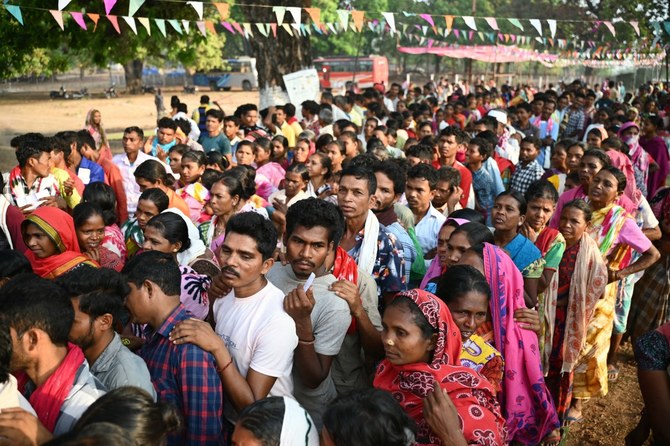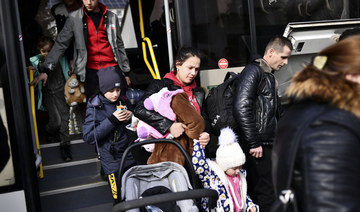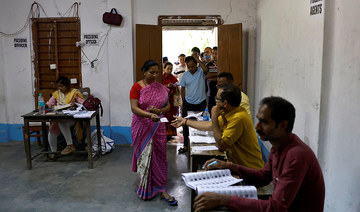In the aftermath of Russia’s invasion of Ukraine, the fog of war is extending to those who are trying to help the beleaguered Ukrainians.
With ports blocked and roads made treacherous by bombings, charities currently can’t send humanitarian aid into Ukraine through normal channels, though both countries agreed Thursday to create corridors to allow those donations to be delivered. The International Committee of the Red Cross has expressed worry that Russian attacks being carried out in densely populated areas are imperiling children, the sick and the elderly.
Yet the complexities of the conflict haven’t stopped aid from reaching Ukrainians. The United Nations says much of the humanitarian effort are now based in neighboring countries to support roughly 1.4 million Ukrainians who have fled the country, mostly to Poland, Hungary and Romania. But charities are also working to send aid to Ukraine itself.
The scale of need is enormous. On Tuesday, the United Nations issued an appeal for $1.7 billion to help with aid efforts, estimating that 12 million people in Ukraine and 4 million refugees could be in need of relief and protection in the coming months.
Filippo Grandi, chief of the UN refugee agency, said his agency had already received more than $40 million in private donations from individuals and companies.
Many corporations have committed to help. Amazon pledged $5 million to the UN’s refugee agency and other humanitarian organizations and plans to match up to $5 million more in donations made by its employees. Snapchat announced $15 million for humanitarian support. Airbnb offered free housing” to up to 100,000 refugees and is waiving its fees on the grassroots movement of people booking stays in Ukrainian homes, with no plans of using them, to get money quickly into the accounts of hosts. And Binance, the world’s largest cryptocurrency exchange, has pledged $10 million toward aid.
Cryptocurrencies donations themselves have emerged as a leading form of aid. Samuel Bankman-Fried, CEO of the cryptocurrency exchange FTX, said his company gave $25 to “each Ukrainian” on FTX.
“Do what you gotta do,” he wrote.
Elliptic, a company that tracks cryptocurrency transactions, said that as of Friday, $56.2 million in digital currencies had been donated to Ukraine’s government and to Come Back Alive, a Ukrainian organization that says it trains and supplies ammunition to Ukraine’s military.
Come Back Alive is set to receive support from a crypto fundraising campaign, Ukraine DAO, that was organized in part by the punk protest group Pussy Riot. The organizer tweeted Wednesday they had raised just over 2,258 ether, equivalent to about $6.7 million.
“This is the first time that we’re seeing sort of a public concerted effort to raise funds to finance an ongoing conflict through cryptocurrency,” said Chris DePow, a regulation and compliance expert at Elliptic.
Inevitably, scammers appear to be trying to profit off the crisis. Elliptic said in a blog post that it had identified crypto fundraising scams that solicited aid for Ukraine.
“If the funds are being raised directly by the government through a publicly announced appeal, or if the funds are being raised through a third-party reputable organization that’s known to be active in this space, that’s probably a safer bet,” DePow said.
As of Wednesday, Meta said, more than $20 million had been raised on its Facebook and Instagram platforms for nonprofits that support humanitarian aid.
Maria Genkin, a board member with the American nonprofit Razom, which was established to help Ukrainians after Russia’s 2014 invasion and annexation of Crimea, said her group has generated donations through their Facebook and Instagram fundraisers to send supplies to Poland.
The usual delivery trucks and other shipping methods, Genkin said, have either been halted or made more dangerous by the war. So supporters are building their own system.
“It’s a system of volunteers essentially crowdsourcing delivery,” she said. “There will be a lot of private cars bringing supplies from Warsaw to Lviv.”
Razom says it would prefer that people donate directly to the Ukrainian Armed Forces through an account opened by the National Bank of Ukraine. But Genkin said she recognizes that many nonprofits cannot give directly give to the military because of tax restrictions and that many donors may object to funding another country’s armed forces.
For that reason, Razom will continue to collect donations for humanitarian aid for Ukraine. It also plans to raise awareness for campaigns to create a no-fly zone over Ukraine and upcoming protests, including one Saturday in New York’s Times Square.
“We’re finding a lot of little things that we can do that add up to big things,” Genkin said.
That’s Nova Ukraine’s plan as well. The American nonprofit, which provides humanitarian aid and raises awareness of Ukrainian issues in the United States, initially planned to collect clothing and other aid and ship it to the country. However, with Ukraine’s ports cut off by Russian forces, that is no longer an option. Igor Markov, one of Nova Ukraine’s directors, said the group will work to send what they have collected to Ukrainian refugee camps in neighboring countries, as well as prepare for ongoing refugee support.
Elsewhere in the US, the Jewish organization UJA-Federation of New York spent the past month preparing for different scenarios with its Ukrainian partners, some of whom had been storing two to three months’ worth of food as a precaution. Once the invasion occurred, said Deborah Joselow, the group’s chief planning officer, the federation managed to quickly deploy $3 million in emergency grants to provide humanitarian support and other aid to roughly 200,000 Jews living in Ukraine.
The initial grants are slated to help their partners — at least 15, with many more affiliates — provide food and medicine for the elderly, Holocaust survivors, people with disabilities and other vulnerable populations. The organization said it’s been receiving inquiries from community activists and others who have taken shelter in bunkers in Odessa and in metro stations across Ukraine.
“They’re scared,” Joselow said. “They’re really, really scared.”
Charities struggle to deliver humanitarian aid into Ukraine
https://arab.news/rdqer
Charities struggle to deliver humanitarian aid into Ukraine

- With ports blocked and roads made treacherous by bombings, charities currently can’t send humanitarian aid into Ukraine through normal channels
After Pakistan alert, WHO likely to issue wider warning on contaminated J&J cough syrup

- The UN health body said it puts out global medical product alerts to ‘encourage diligence’ by authorities
- The WHO this week sent out alert on five batches of contaminated cough syrup ingredients found in Pakistan
LONDON: The World Health Organization is likely to issue a wider warning about contaminated Johnson and Johnson-made children’s cough syrup found in Nigeria last week, it said in an email.
Nigeria’s regulator recalled a batch of Benylin paediatric syrup last Wednesday, having found a high level of diethylene glycol in the product during routine testing.
The contaminant, alongside another closely related toxin, ethylene glycol, has been linked to the deaths of more than 300 children in Cameroon, Gambia, Indonesia and Uzbekistan since 2022, though there is no evidence that these incidents are linked with the latest recalls.
The UN health body said it puts out global medical product alerts to “encourage diligence” by national authorities and was likely to do so in this instance, “subject to confirmation of certain details from parties.”
The recalled batch of Benylin syrup was made by J&J in South Africa in May 2021, although Kenvue now owns the brand after a spin-off from J&J last year.
J&J has referred requests for comment to Kenvue. In an emailed statement on Friday, Kenvue said it had carried out tests on the batch recalled by Nigeria and had not detected either diethylene or ethylene glycol.
“We continue to work closely with health authorities and the WHO and are engaging with NAFDAC to understand their test results, including verifying the authenticity of the sampled product, the testing methodology used, and results reported by the agency,” the statement added.
Since Nigeria’s recall, five other African countries have also pulled the product from shelves — Kenya, Rwanda, Tanzania, Zimbabwe and South Africa, where the drug was made.
South Africa’s regulator has also recalled another batch of the syrup, which is used to treat coughs, hay fever and other allergic reactions in children.
Diethylene glycol is toxic to humans when consumed and can result in acute kidney failure, although there have been no reports of harm in the latest incident.
RAW MATERIALS
In the 2022 cases, the contamination in the syrups came from the raw materials used by manufacturers in India and Indonesia.
The WHO said it was collaborating with both the manufacturer and regulatory authority in South Africa to investigate the Benylin paediatric syrup, and had information on the source of the ingredients used. Kenvue has previously said it tested its ingredients before manufacture.
The agency said the possibility that the syrup was counterfeit was also “under consideration as part of investigations.”
Earlier this week the WHO sent out a separate alert on five batches of contaminated cough syrup ingredients found in Pakistan that appeared to have been falsely labelled as Dow Chemical products.
It was the first alert the WHO has sent on excipients — elements of a medicine other than the active pharmaceutical ingredient — rather than finished products, the agency confirmed on Friday.
The batches of propylene glycol were contaminated with ethylene glycol.
“It was critical for WHO to also alert manufacturers that may have been procuring this material to exercise more caution,” a WHO spokesperson said by email.
Propylene glycol is not an ingredient in Benylin paediatric syrup, a Kenvue spokesperson said on Friday.
Polish flag carrier LOT cancels Friday flights to Tel Aviv and Beirut, PAP reports

- Decisions about future flights would be made on an ongoing basis
WARSAW: Polish national airline LOT canceled flights on Friday to Tel Aviv and Beirut due to the unstable situation in the region, a spokesperson was quoted as saying by state news agency PAP.
“Today’s flight 151/152 to Israel from Warsaw and to Beirut 143/144 have been canceled,” Krzysztof Moczulski told PAP. He said decisions about future flights would be made on an ongoing basis.
French police arrest man who threatened to blow himself up at Iran’s Paris consulate

- Police verifying man’s identity and trying to determine whether he had weapons
PARIS: A man who had threatened to blow himself up at Iran’s consulate in Paris was arrested by police, a police source said.
French police earlier cordoned off the Iranian consulate, Reuters reporters saw, and did not immediately confirm finding any weapons.
A police source told Reuters the man was seen at about 11 am (0900 GMT) entering the consulate, carrying what appeared to be a grenade and explosive vest.
A Paris police official told The Associated Press that officers were verifying the man’s identity and trying to determine whether he had weapons.
Police earlier said they were at the scene and asked the public to avoid the area but provided no further details.
Service was interrupted on a nearby metro line for security reasons, the RATP metro company said.
A police cordon remained in place on Friday afternoon, but traffic was resuming in the area.
A person at the Iranian embassy who responded to a call from Reuters declined to provide any information on the situation.
It was unclear whether the incident had any link to the escalating tensions between Iran and Israel.
Earlier on Friday, explosions echoed over the Iranian city of Isfahan in what sources described as an Israeli attack, but Tehran played down the incident and indicated it had no plans for retaliation — a response that appeared gauged toward averting region-wide war.
The incident also comes as Paris is gearing up to host the summer Olympics.
* With Reuters and AP
Blinken says US ‘not involved in any offensive operation’

- ‘All I can say is for our part and for all the members of the G7 our focus is on de-escalation’
CAPRI, Italy: US Secretary of State Antony Blinken on Friday refused to comment on reports of an attack by Israel on Iran, beyond saying Washington was “not involved in any offensive operation.”
Speaking to journalists after a meeting with G7 counterparts in Italy, he declined to answer repeated questions about explosions in Iran, and reports that Israel had carried out retaliatory strikes.
“I’m not going to speak to these reported events... All I can say is for our part and for all the members of the G7 our focus is on de-escalation,” Blinken told a press conference on the island of Capri.
“The US has not been involved in any offensive operation,” he said.
Speaking to reporters earlier, G7 host Antonio Tajani, the foreign minister of Italy, said Washington had been informed in advance of the strikes, without giving details.
“The United States were informed at the last moment,” he said, adding that “it was just information” passed on — without saying who by.
The reports dominated the G7 Friday, with Tajani forced to change the agenda, but little public information emerged.
In its final statement, the Group of Seven ministers said: “In light of reports of strikes on April 19th, we urge all parties to work to prevent further escalation. The G7 will continue to work to this end.”
Israel had warned it would hit back after Iran fired hundreds of missiles and drones at Israel almost a week ago, in retaliation for a deadly strike — which Tehran blamed on its foe — that levelled Iran’s consular annex at its embassy in Syria.
Indians head to the polls in world’s biggest election

- Polling takes place in phases over the next six weeks, with results expected on June 4
- Over 968 million people are registered to vote, with 168.6 million casting ballots on Friday
NEW DELHI: Indian voters headed to the polls on Friday for the first phase of the world’s biggest general election, in which Prime Minister Narendra Modi is aiming for a rare third consecutive term.
More than 968 million people are registered to vote, with polling taking place over the next six weeks, as results are expected on June 4.
After April 19, the other voting dates will be April 26, May 7, May 13, May 20, May 25 and June 1, with some states completing the process on a single day, and others having it spread out in several phases.
Friday’s polling was held in 21 states and union territories, including the most populous ones such as Uttar Pradesh, Bihar, Rajasthan, Tamil Nadu, and Maharashtra, as well as smaller northeastern states and the northern Himalayan territory of Jammu and Kashmir.
In Kashmir, this is the first election since its special autonomous status and statehood were scrapped through the Indian government’s controversial constitutional amendment in 2019.
Chief Election Commissioner of India Rajiv Kumar told reporters on Friday that 168.6 million people were expected to cast their ballots on Friday.
“The preparations started, actually, two years back. Wide range of preparations … It’s a tremendous exercise,” he said.
MAIN CONTENDERS
More than 2,600 political parties are registered in the marathon election and 543 contested seats in the lower house of Parliament. The party or coalition that wins at least 272 is going to form the government.
Modi is targeting 400 seats for the National Democratic Alliance led by his Hindu nationalist Bharatiya Janata Party, which has been in power since 2014.
He is challenged by an alliance of two dozen opposition parties — the Indian National Developmental Inclusive Alliance, or INDIA, led by the Congress Party, which has ruled the country for close to 45 years since its independence in 1947.
The key leader of the opposition coalition is Rahul Gandhi — the son of Rajiv Gandhi, a grandson of Indira Gandhi, and a great-grandson of Jawaharlal Nehru, all of whom served as prime ministers of India.
While the opposition is trying to appeal to Indian youth with promises to tackle unemployment, free education and medical facilities, the BJP has deployed the same tactics as in previous polls — by mobilizing voters through majoritarian Hindu sentiment, despite constitutional provisions that make it a secular state.
Opinion polls show Modi as frontrunner, with 48 percent of respondents in the most recent survey released by the Centre for the Study of Developing Societies last week naming him as their choice for the prime minister. Gandhi was second, preferred by 27 percent.
“Modi has created an image of a powerful leader, a leader who is not only popular in India but outside too. He has also created an image of not pandering to Muslim communities in India … This image of a leader who does not appease the Muslim sentiments appeals to the Hindu masses. Politics of polarization helps Modi to build an image and aura among a large section of the Hindu voters,” Prof. Venkat Narayan, political analyst and commentator, told Arab News.
“Then the use of social media and the mainstream media is also there to create an image and broaden Modi’s appeal. The media plays a great role in creating this image, they are soft towards Modi and do not ask critical questions.”
If Modi wins the election, he will become the second prime minister, after Nehru, to succeed in three consecutive polls.
“Modi is leading in the polls as he has created an image of doing a lot for different sections of the society. Besides, he projects himself as squeaky clean. People also think that as he has no children, he has no reason to be corrupt or be on the take,” Sanjay Kapoor, analyst and editor of the English-language political magazine Hardnews, told Arab News.
“There are other reasons for his popularity, which include adroit use of media and social media that control all criticism against him. Then there are issues of raising India’s global profile and pursuing an independent foreign policy.”
FUTURE FOREIGN POLICY
Whoever wins the election, the foreign policy direction is likely to remain broadly unchanged, except for India’s orientation toward Israel and Palestine.
Support for Palestine and Palestinian statehood was once an integral part of India’s foreign policy, but in recent years, under Modi’s rule, New Delhi has become closer to Tel Aviv, despite civil society protests breaking out across the country against Israel’s deadly war on Gaza.
“If the INDIA alliance comes to power, then we may see a change in our policy towards Israel and Palestine. The INDIA alliance is sympathetic to Palestinians,” Kapoor said.
“We expect that the INDIA alliance will also restore ties with neighbors like Pakistan, (and) revive SAARC (South Asian Association for Regional Cooperation).”
The member states of SAARC — a regional intergovernmental organization and geopolitical union of states in South Asia — are Afghanistan, Bangladesh, Bhutan, India, Maldives, Nepal, Pakistan, and Sri Lanka.
The last biennial SAARC summit was hosted by Nepal in 2014. Pakistan was to host the summit in 2016, but it was stalled after India refused to participate, following an attack on an Indian army camp in Kashmir that New Delhi blamed on Pakistan-based militants.
VOTERS’ CONCERNS
According to the Centre for the Study of Developing Societies survey, unemployment emerged as the top concern for 27 percent of respondents.
Some 62 percent also said it has been more difficult to find a job in the last five years — during Modi’s second term in office.
“The biggest concern remains inflation and unemployment. The possibility of getting a job decreases if you study more. People are forced to leave India in search of jobs. Some have even gone as far as Russia and Israel,” Kapoor said. “The situation is really dismal.”
Rising prices and inflation were also a major issue — the top concern for 23 percent of the people surveyed by the CSDS.
“Women and the middle class are concerned about the rising prices. Modi is trying to divert attention from these main issues by talking about religion and temples,” said Shashi Shekhar Singh, associate professor at Satyawati College at the University of Delhi.
The CSDS pre-poll also revealed that despite the ruling party’s narrative promoting Hindu nationalist dominance to establish a majoritarian state in India, only 11 percent of respondents saw India as solely for Hindus.
But there were fears the reality on the ground could change if the BJP tried to amend India’s liberal and democratic constitution.
“Indian secularism and the very idea of a plural democracy is at stake,” Singh said.
“There is a fear that if the BJP comes to power with the thumping majority, the liberal and secular democracy will breathe its last. The BJP might lead the nation further down the path of a Hindu majoritarian state.”




















